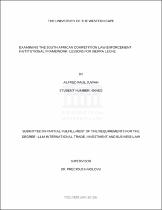| dc.description.abstract | Trade liberalisation, free-market system, privatisation and deregulation have become major steps taken by individual countries to accelerate economic growth. This trend has made competition law and its enforcement institutional framework pivotal, especially so with the advent of the African Continental Free Trade Agreement (AfCFTA). A liberalised trade and a free market system without effective machinery to checkmate the activities of market participants would invariably give rise to anti-competitive practices such as monopolies, abuse of dominant position, cartels, and vertical restraints. These anti-competitive practices have an adverse effect on trade. Sierra Leone has made commitment to liberalise its market space, deregulating and developing the private sector to accelerate economic growth. This goal would be challenging, without an extant competition law statute and an independent enforcement institutional framework to address anti-competitive practices in the country. | en_US |

